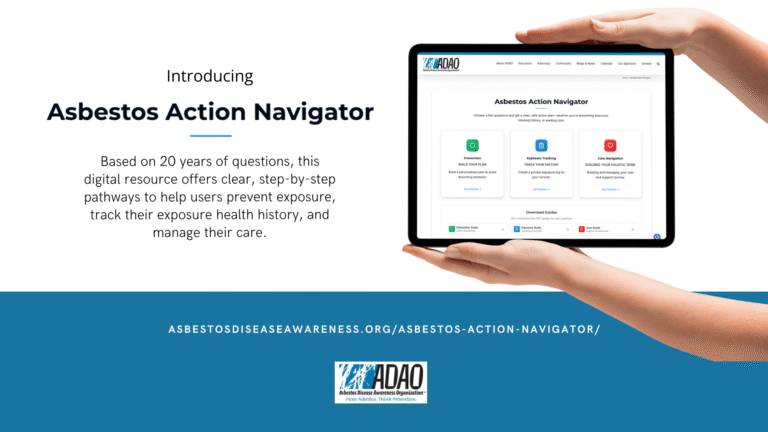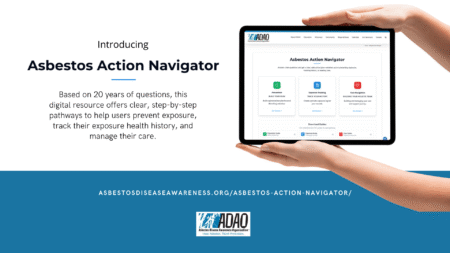Presented at the Asbestos Disease Awareness Organization (ADAO) Press Conference in Washington, D.C. on April 4, 2013
Posted on April 9, 2013
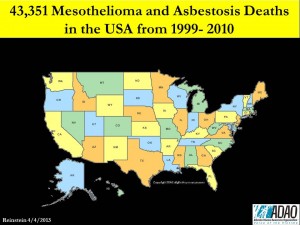
Exposure to asbestos can cause mesothelioma and lung, gastrointestinal, laryngeal, and ovarian cancers, as well as non-malignant lung and pleural disorders. The National Institute for Occupational Safety and Health (NIOSH) database statistics revealed that, from 1999 – 2013, the USA buried 43,351 Americans who died from mesothelioma and asbestosis – just two of the many diseases caused by asbestos.
In response to this continued public health crisis, eighteen months ago, I began asking five questions:
- Who are the U.S. companies and/or government agencies importing asbestos?
- What asbestos-containing products are being manufactured in the U.S.?
- What asbestos-containing products are being used in the USA?
- What asbestos-containing products does the USA import?
- What asbestos-containing products does the USA export?
What seems simple isn’t always easy. I have been unable to get answers to any of my questions due to U.S. Code Title 13, Chapter 9, Section 301(g), which protects the confidentiality of export data collected by the U.S. Census Bureau. This roadblock led me to a different question: Why is the United States “dependent on imports to meet manufacturing needs,” as the U.S. Geological Survey (USGS) states?
Ultimately, I uncovered new information about the “USA Asbestos Toxic Trade,” U.S. ports of entry for asbestos, and U.S. institutions and mutual funds shareholders of Eternit S.A.
MINING
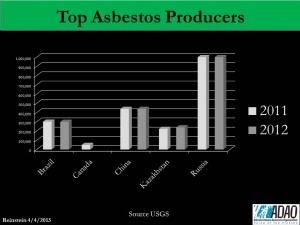
Asbestos is deadly, and remains a consumer, environmental, and occupational threat. The USGS has stated for decades that “numerous materials substitute for asbestos in products.” The federal government and individuals are still funding remediation, rehabilitation, and abatement for decades of asbestos use at a high price in dollars and lives. Nonetheless, the USGS foresees that “U.S. asbestos consumption is likely to remain near the 1,000-ton level, as it has in the past 4 years.”
MANUFACTURING
According to the Center for Public Integrity, the American Chemistry Council released a statement saying, “Diaphragms made of asbestos are a critical separation medium in the chlorine manufacturing process. Chlorine is essential for manufacturing life-saving medicines, producing solar cells, and providing safe drinking water.” The statement asserted that chlorine producers “work to manage the risks and potential adverse effects to human health and the environment” and “workers potentially exposed to asbestos are protected by wearing appropriate personal protective equipment and following strict work processes.”
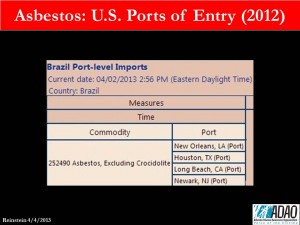
COMMERCE
Research led me to the U.S. ports of entry for asbestos commodity 2524. U.S. government data confirms that, in 2012, the four points of entry for asbestos from Brazil were in Louisiana, Texas, California, and New Jersey. The U.S. continues to import asbestos although substitutes exist. Why? I decided to follow the money for Brazilian asbestos exports, which led me to Eternit S.A.
Eternit S.A. was established in Brazil in 1939. The company manufactures asbestos-cement products, as well as non-asbestos cement, plaster and plastic products. SAMA, an Eternit S.A. subsidiary, is involved in the extraction and processing of chrysotile asbestos mineral/ore.
As a publicly traded company, Eternit’s profile is accessible to the U.S. government and investors. Eternit S.A. openly states that they manufacture various asbestos cement products, including tiles, water tanks, and complementary parts, and the company is also involved in the exploration and sale of chrysotile mineral/ore. In Brazil, chrysotile is mainly used in fiber cement products (asbestos cement) as corrugated roofing, flooring boards, partition panels and water tanks.
Eternit S.A. has attracted U.S. investors. Eternit S.A. institutional and mutual fund shareholders include Mellon Capital Management Corporation, The Vanguard Group, Inc., and State Street Global Advisors.
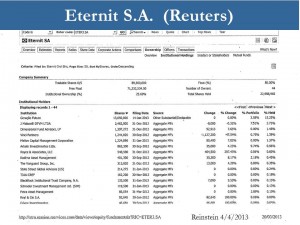
ADAO calls on the U.S. Congress to immediately take action to stop asbestos imports and pass ban asbestos legislation. As I remind Congress, “One life lost to a preventable asbestos-caused disease is tragic; hundreds of thousands of lives shattered is unconscionable.”
Linda Reinstein
View the complete PowerPoint on SlideShare below:

